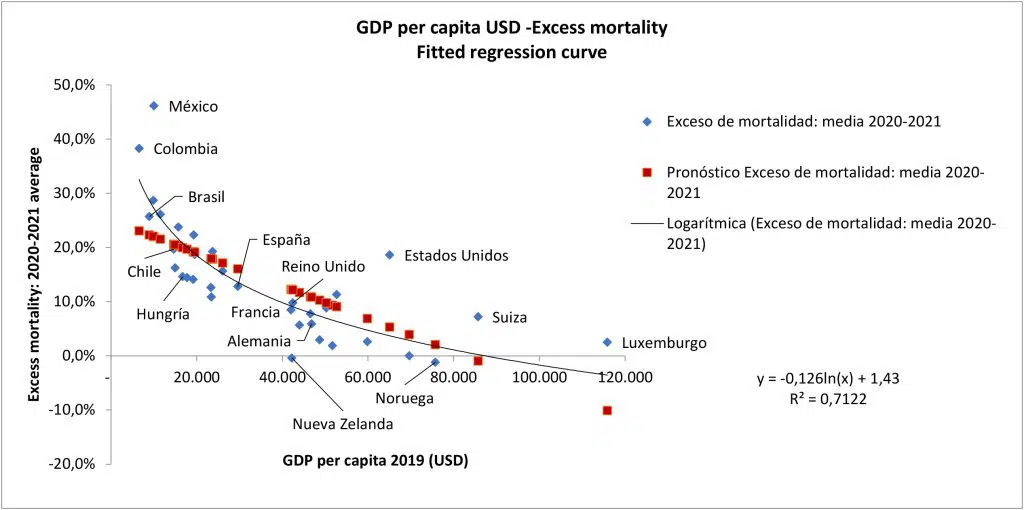ECONOMY| 24.03.2022
Which countries have done the best job managing the pandemic?
The Covid-19 pandemic came as a shock to the system all over the world, causing deep social and economic repercussions. It also made us more aware than ever before that we live in a world that is so interconnected that a catastrophe that takes place in one country can end up affecting the whole planet. But given that two years have passed since the outbreak of the pandemic, and with its end closer in sight, we can now take stock of its impact, looking at which regions were worst affected and how well different governmental responses worked.
MAPFRE Economics, at MAPFRE Economic Research, has analyzed the data from 39 different countries from 2020 to 2021, and they have created an index to classify each country according to the effectiveness of their management of the pandemic, based on five factors. The premise is that those countries that had less excess mortality and restrictions, but a higher vaccination rate, a healthcare system in place that was more capable of responding to emergencies, and stronger economic recovery in 2021, were those that were better at handling Covid-19.
By comparing the data of different countries’ death tolls with economic, healthcare, and public policy figures, the report, “Covid-19: a preliminary analysis of its demographic impact and the insurance industry” (spanish version) allows us to look at the correlation between excess mortality and different characteristics of each country. Regarding this last point, the relation between GDP and the number of estimated Covid-19 victims in these last two years is especially significant.
South Korea, Norway, and New Zealand lead the ranking
According to the Effectiveness of Pandemic Management Rate (IEGP), obtained using a formula that weighs the variables mentioned before, the country with the best response to the pandemic was South Korea. This Asian nation reported better outcomes than average in terms of its excess mortality, economic, and healthcare figures, although its severe restrictions set it apart from other countries, a factor which was taken into consideration using a government response tracker created by the University of Oxford. Norway and New Zealand also placed at the top of the ranking.
The classification of pandemic response effectiveness places Iceland, Denmark, Japan, and Finland next in the ranking. These countries, like those at the top of the list, are characterized by their high levels of development, and though they are handling the pandemic with better-than-average indicators, their economies took hard hits. Japan is an especially noteworthy case. Though their healthcare system is considered to be the best in the world, and they were able to contain the worst effects of Covid-19 with few restrictions, their economic performance in 2021 was the worst of all the countries in the set.
This table shows the top 10 countries as classified by the Effectiveness of Pandemic Management Rate, which was developed using specific information from 39 countries for the variables that were analyzed.

“The results produced by this analysis show that the appropriate response to the pandemic is based on multiple factors. The strength of a nation’s health care system and its accessibility to all of the population, as well as its vaccination drives, naturally play a key role, but public policy measures that mitigated negative impacts on the economy were also essential,” noted Manuel Aguilera, the general manager at MAPFRE Economics.
Spain, in 18th position
Spain placed 18th in the report’s ranking, and can be found in the middle of the table. Spain has a high vaccination rate amongst its population and an impressive healthcare capacity, but it also has a high rate of excess mortality, rigorous restrictions and moderate economic recovery.
And in general, apart from the Baltic and Nordic countries, the rest of Europe doesn’t fare that well in the overall assessment of these last two years of the pandemic. European powers such as France, the United Kingdom, and Germany come trailing behind Spain, at 19th, 25th, and 27th place, respectively. The southern region of the Old Continent was especially affected, with Portugal coming out slightly ahead of Spain at 15th place, but with Greece and Italy, at 32nd and 33rd place respectively, finding themselves at the tail end of the battle against Covid-19.
Latin America, one of the hardest hit regions
Analysts at MAPFRE Economics point out that Latin America was probably the region most affected in terms of mortality rates in the world, which caused it to receive relatively negative IEGP scores. According to the study, Chile was the country that best handled the pandemic in the region, coming ahead of Brazil, Colombia, and Mexico.
“The pandemic hit the Latin American region especially hard. However, despite their fragile healthcare systems, the region put in a great deal of effort to get their populations vaccinated, as can be seen in the partial indicator that was used to analyze the IEGP of the majority of Latin American countries in the study, especially in the case of Chile,” asserted Manuel Aguilera.
GDP, a decisive factor
When analyzing certain structural variables alongside excess mortality, MAPFRE Economics found that its greatest correlation was with GDP per capita, even more so than with healthcare capacity.
“It’s indisputably evident that countries with a lower GDP per capita and weak healthcare systems (factors which have close structural links) faced more lethal consequences of Covid-19. This is reflected in their higher excess mortality rates in the first two years of the pandemic,” indicated the general manager at MAPFRE Economics.

The other variable that is closely linked to mortality is healthcare system capacity under normal conditions (prior to the outbreak of the pandemic), which MAPFRE Economics measured by creating the Indicator of Effectiveness of Health Systems. This indicator takes into account factors such as life expectancy, infant mortality rates, and the percentage of mortality due to non-communicable diseases among people between the ages of 30 and 70 years.
Though this variable showed a high correlation, it should be pointed out that if the analysis were to only include the year 2020, and not 2021, there is less of a correlation, which illustrates the catastrophic nature of pandemics, an event which quickly overwhelms healthcare systems due to a lack of adequate preparation. But when looking at longer periods, the effectiveness of healthcare systems becomes extremely important, and for this reason countries with weaker systems suffered much more from the consequences of each wave of the pandemic.
Thus, one of the conclusions that this study puts forward is that having a robust healthcare system was a key factor in reducing excess mortality, as well as having early warning systems and international systems to coordinate information sharing. These systems allowed various measures to be quickly adopted in the first phases of the spread of the pandemic, and many advances have been made as a result of this global crisis.

